 Petzlover
Petzlover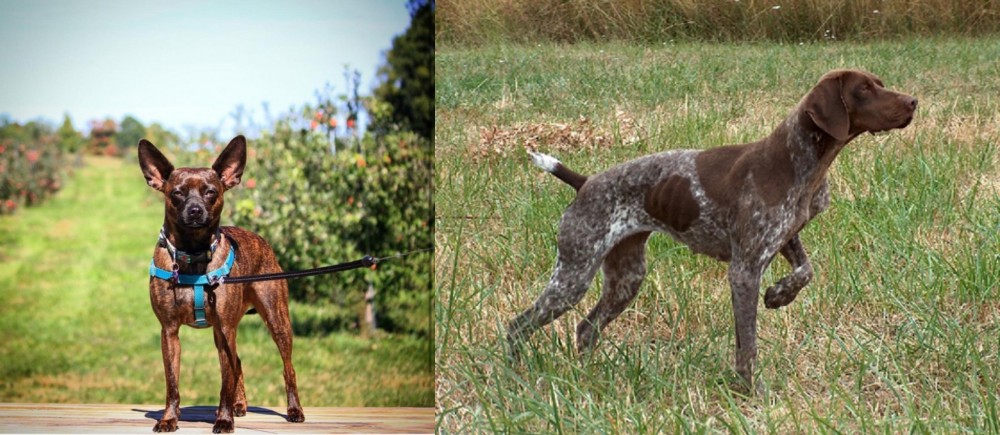 Bospin is originated from United States but Braque Francais is originated from France. Bospin may grow 31 cm / 12 inches shorter than Braque Francais. Bospin may weigh 44 kg / 97 pounds lesser than Braque Francais. Both Bospin and Braque Francais has same life span. Bospin may have less litter size than Braque Francais. Both Bospin and Braque Francais requires Low Maintenance.
Bospin is originated from United States but Braque Francais is originated from France. Bospin may grow 31 cm / 12 inches shorter than Braque Francais. Bospin may weigh 44 kg / 97 pounds lesser than Braque Francais. Both Bospin and Braque Francais has same life span. Bospin may have less litter size than Braque Francais. Both Bospin and Braque Francais requires Low Maintenance.
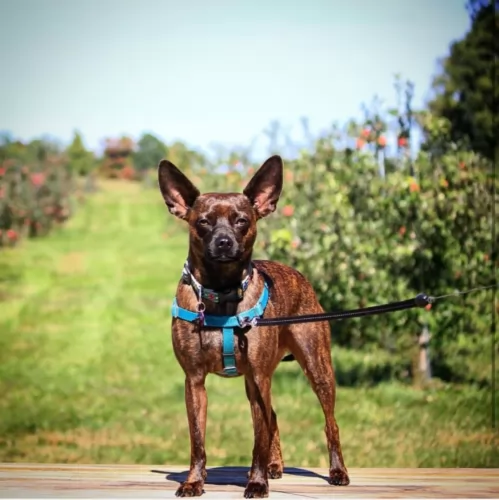 The Bospin is a fairly new breed of dog and is the result of cross-breeding between the Boston Terrier and the Miniature Pinscher.
The Bospin is a fairly new breed of dog and is the result of cross-breeding between the Boston Terrier and the Miniature Pinscher.
Mixed breed dogs are often healthier than full blood dogs and are becoming a popular choice. The origin of the Bospin is unknown. We know that the Boston Terrier hails from Boston in the USA and the Miniature Pinscher from Germany.
 Braque Francais was at first one general breed of hounds in the Gascognes and Pyrenees Mountains areas of France. The one breed became two. Known as the Braque Francais Gascognes and the Braque Francais Pyrenees - two separate breeds of very alike dogs. The Gascognes is a lot less common than his smaller brother. Not very much is known about the beginnings of these two strains of Braque Francais as the breed has been around since at least the 15th century. Because the Braque Francais was exported or taken to so many different countries in the 15th-18th centuries, a lot of the origins of the breeds were lost. A major bloodline search was The conducted in the 19th century and found that these were two very distinct breeds of dog.
Braque Francais was at first one general breed of hounds in the Gascognes and Pyrenees Mountains areas of France. The one breed became two. Known as the Braque Francais Gascognes and the Braque Francais Pyrenees - two separate breeds of very alike dogs. The Gascognes is a lot less common than his smaller brother. Not very much is known about the beginnings of these two strains of Braque Francais as the breed has been around since at least the 15th century. Because the Braque Francais was exported or taken to so many different countries in the 15th-18th centuries, a lot of the origins of the breeds were lost. A major bloodline search was The conducted in the 19th century and found that these were two very distinct breeds of dog.
It is known that France was the birthplace of this breed and it was developed because of a need for a tracker that could point, flush and retrieve. The Braque Francais Gascogne probably came from the south of France. It is related to the German Shorthair Pointer and the English Pointer as well. Having existed since the 15th century, he was the father of all pointing dogs in France. By the 17th century the breed had grown enough to be called the “old style Braque Francais”,
Though the origin of the breed is not known there are of course several theories about it. The most prevalent belief is that the Braque Francais Gascogne is a descendent of the Chien d’Oysel, a spaniel breed of medium size and white or brown with brown markings. The Chien d’Oysel is an ancient breed used for hunting prior to the 13th century. Hunters crossed the Chien with local dogs on a routine basis.
Braque Francais came out of these breedings. It was probably French Scent hounds that created the larger size of the Gascogne. This also increased the stamina and strength of the Gascogne as opposed to the Pyrenees. There was also a mixing in of the Grand Bleu De Gasgogne and the Petit Bleu De Gasgogne.
The other prominent theory is that this breed the Gasgogne was actually developed from the Portugese, Spanish and Italian pointers rather than the French dogs. These dogs originated not with the Chien d’Oysel but with the scent hounds. From these dogs came the Spanish and English Pointers. All that is truly known is that all of these types of dogs were present in Europe by the fifteenth century and were moved among countries and cross bred regularly. However in the part of France called the Central Pyrenees region and in a small southern part of France the original, old style Braque Francais was pure bred. This aspect of the breed contributed to the development of all of the French pointers and European shorthaired dogs. By the end of the 1800’s today’s breed was developed.
In 1850 the first Braque Francais breed club was established and in the breed standards for both dogs followed in 1880. They were then registered in the French Kennel Club and the International Kennel Club (FCI). The French Kennel Club does not allow dogs with any common ancestors in Generations 1-3 into the Club in order to keep out the practice of inbreeding. In Canada only the Gascogne is recognized and the United States’ United Kennel Club (UKC) recognizes both. The American Kennel Club (AKC) does not recognize either.
With most local regions and countries choosing their local dogs over other breeds, the Braque Francais Gascogne has become fairly rare outside of France where the breed was the most popular gun dog throughout the 1700’s. The Gascogne was mostly a dog of the hunting nobility because of its size and food needs. Following the French Revolution, the breed fell off dramatically, while the smaller Pyrenees continued to thrive. This was because in the Pyrenees Mountains and the Southwestern region of Gascony, the English Pointer never supplanted the Braque Francais.
The Second World War was brutal to the Braque Francais Gascognes and as it recovered it became much less common than its sister breed. Today it is found almost exclusively in France.
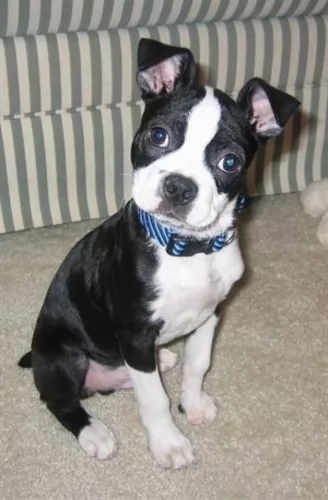 The Bospin, a cross between the smooth haired Boston Terrier and the Miniature Pinscher can actually get any combination and characteristics of either of these two breeds. found in either breed. The Bospin in a small to medium sized dog who can live to be up to 15 years of age.
The Bospin, a cross between the smooth haired Boston Terrier and the Miniature Pinscher can actually get any combination and characteristics of either of these two breeds. found in either breed. The Bospin in a small to medium sized dog who can live to be up to 15 years of age.
He has a short coat, but his looks will essentially depend on which is the more dominant breed. Regardless of which breed he takes after in looks, he will be a muscular little dog with long, lean legs and a long tail. They have small muzzles and a fairly long nose with brown eyes and upright ears. The short coat can be in a number of colours such as brown, beige or brindle, with black and white being a more common colour.
The Bospin’s personality can be a blend of the Boston Terrier and the Miniature Pinscher. They’ve become such popular little dogs, full of fun and just loving to be with their human family. Because they are fairly even tempered, they make excellent family pets and will get on well with children in the home as well as other pets. This is a small dog but he isn’t a yapper. He isn’t going to make a wonderful watchdog as he can be quite friendly with strangers.
 The Braque Francais Gascogne is a larger dog than the Pyrenees breed and is a very handsome dog. Both have a deep chest, a solid bodies, strong and slender legs and are well-proportioned. They have padded, round paws and a large brown head with floppy ears. The muzzle is a pointed block and he has a scissors bite, with a black nose and dark or amber eyes. The eyes are very expressive and round. The tail can be straight and long, or it can be docked. They are tall and athletic.
The Braque Francais Gascogne is a larger dog than the Pyrenees breed and is a very handsome dog. Both have a deep chest, a solid bodies, strong and slender legs and are well-proportioned. They have padded, round paws and a large brown head with floppy ears. The muzzle is a pointed block and he has a scissors bite, with a black nose and dark or amber eyes. The eyes are very expressive and round. The tail can be straight and long, or it can be docked. They are tall and athletic.
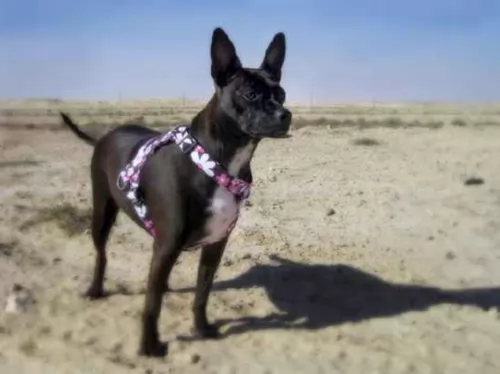 The Bospin is an adaptable dog and can easily fit into farm life or city life. When he is trained and socialized he makes an amicable pet, ready to be a loyal and devoted companion.
The Bospin is an adaptable dog and can easily fit into farm life or city life. When he is trained and socialized he makes an amicable pet, ready to be a loyal and devoted companion.
The Bospin’s personality can actually lean more towards either the Boston Terrier or the Miniature Pinscher, but you’re always going to have fun and games with these entertaining little dogs. They just love the companionship of their human family.
A Bospin needs to be brought into a stable environment so that he can adapt to his new home easily and not be confused by constant changes. Be responsible with your pet and make him one of your family and you’ll be rewarded with an entertaining, fun, loyal 4-legged friend.
 This is a working breed, but they are nevertheless friendly and loyal to their families. They want to please their people and are usually docile. They love kids and are good as a first ever dog. They are friendly and even-tempered. They tolerate people they do not know but can be shy and are not guard dogs. instead they are loving, affectionate and people oriented. They need to be with their families and never left outside alone. They can develop separation anxiety.
This is a working breed, but they are nevertheless friendly and loyal to their families. They want to please their people and are usually docile. They love kids and are good as a first ever dog. They are friendly and even-tempered. They tolerate people they do not know but can be shy and are not guard dogs. instead they are loving, affectionate and people oriented. They need to be with their families and never left outside alone. They can develop separation anxiety.
 Your Bospin is a healthy dog breed, but the most healthiest pets can fall victim to health problems. There are some conditions that are specific to certain types of dogs and smaller breeds have their own set of worrisome dog ailments.
Your Bospin is a healthy dog breed, but the most healthiest pets can fall victim to health problems. There are some conditions that are specific to certain types of dogs and smaller breeds have their own set of worrisome dog ailments.
Smaller dogs or toy breeds have smaller skulls and sometimes their smaller mouths have to find room to house the 42 teeth that dogs have. This over-crowding can lead to dental disease.
This is a common problem in brachycephalic breeds – those dogs that have short, broad muzzles such as the Boston Terrier. Toy breeds are more prone to tracheal collapse, a common cause of airway obstruction in dogs where the dog develops a rasping cough and labored breathing.
This is a developmental orthopedic disease where you see degeneration of the femoral head and which can lead to arthritis. The disease affects young animals and more specifically toy breeds. Your dog will have trouble walking and will usually hold one leg up. Your dog can battle along with pain and arthritis.
 The Braque Francais is a fairly healthy breed. They are susceptible to certain health conditions that most dogs of their size and working history are susceptible to. These include Patellar luxation which seems to be one of the most common problems for them. They also can have hip and/or elbow dysplasia, aortic stenosis which is a narrowing of the aorta, and some eye issues such as ectropion, entropion, and PRA (Progressive Retinal Atrophy as well as cataracts.
The Braque Francais is a fairly healthy breed. They are susceptible to certain health conditions that most dogs of their size and working history are susceptible to. These include Patellar luxation which seems to be one of the most common problems for them. They also can have hip and/or elbow dysplasia, aortic stenosis which is a narrowing of the aorta, and some eye issues such as ectropion, entropion, and PRA (Progressive Retinal Atrophy as well as cataracts.
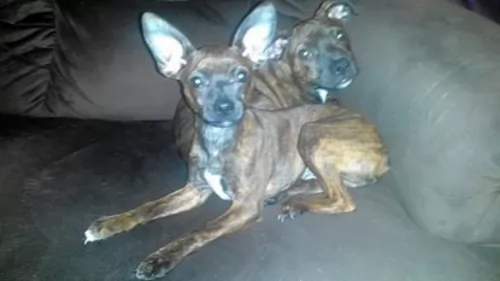 Because of the short coat and minimum shedding, your Bospin will only require minimal maintenance. Brush him down at least twice a week to keep the short coat free of loose hair and to also keep it shiny and glossy. As with any other dog breed, he should have his teeth brushed at 2 or 3 times a week with special dog toothpaste and toothbrush. Don’t be tempted to use human toothpaste. Check his ears too to make sure they are free of dirt and infection.
Because of the short coat and minimum shedding, your Bospin will only require minimal maintenance. Brush him down at least twice a week to keep the short coat free of loose hair and to also keep it shiny and glossy. As with any other dog breed, he should have his teeth brushed at 2 or 3 times a week with special dog toothpaste and toothbrush. Don’t be tempted to use human toothpaste. Check his ears too to make sure they are free of dirt and infection.
The Bospin is a hybrid breed and because he comes from two energetic dogs, you’ll need to provide him with activities to keep him busy. He will love to go on a walk with you and you can play ball games with him in the garden or even indoors. He isn’t a working dog so he isn’t going to demand too much activity, but it is better to get into the habit of exercising him regularly to keep him in good shape and to maintain his good health.
Bospins need to be fed carefully to avoid weight issues or health problems. Puppies need to eat frequently - 4 times a day. For your Bospin, always go for top quality commercially produced dog foods where meat is the top ingredient. Home made foods are always a wonderful choice for your pet and this can include meat, rice and vegetables.
If you’re unsure about feeding your dog, get advice from your vet. Always have fresh, cool water available and make sure you wash out the water bowl regularly.
 This is a high energy, working dog with a need for a high-quality energy food or raw food that you make up yourself. Be sure to include chicken, beef and fish. Feed him about 3 cups once a day or 1.5 cups twice a day.
This is a high energy, working dog with a need for a high-quality energy food or raw food that you make up yourself. Be sure to include chicken, beef and fish. Feed him about 3 cups once a day or 1.5 cups twice a day.
In addition to the conditions listed above, his long floppy ears can lead to ear infections if not cared for. Wash them out daily. He is also susceptible to bloat so don’t feed him large meals and don’t let him exercise or work right before or right after exercise.
These dogs have a variety of hunting skills. They are not only pointers but can flush, trail and retrieve. The Gascogne is not as quick as the Pyrenees. They need a lot of exercise daily or they need a hunting job. They would do well with barn hunt, lure coursing and free play in an off leash fenced in area. If they don’t get rid of their energy, they can be destructive. They were bred to hunt and cannot resist the chase,